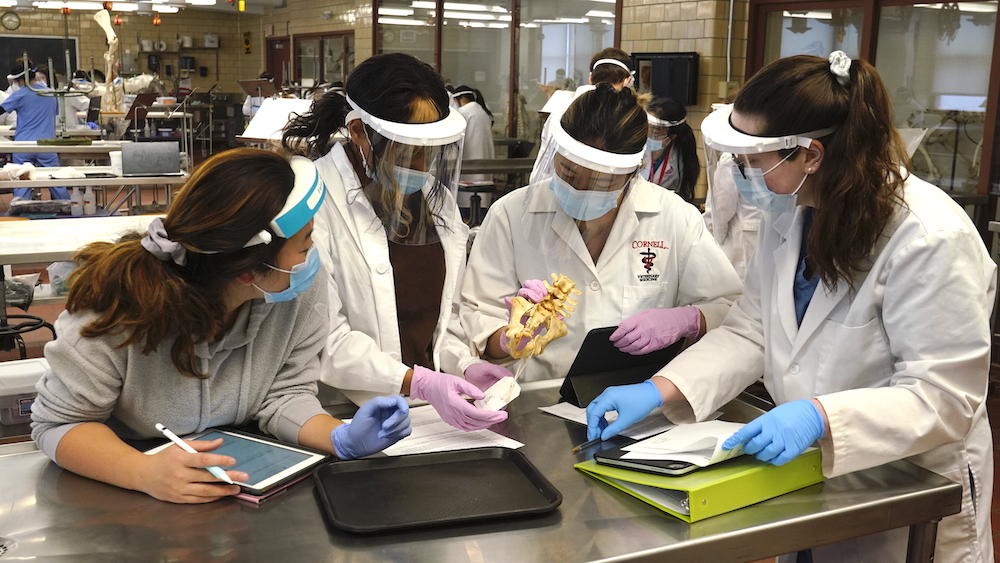Changing Course: Veterinary Students Reflect on Learning During a Pandemic
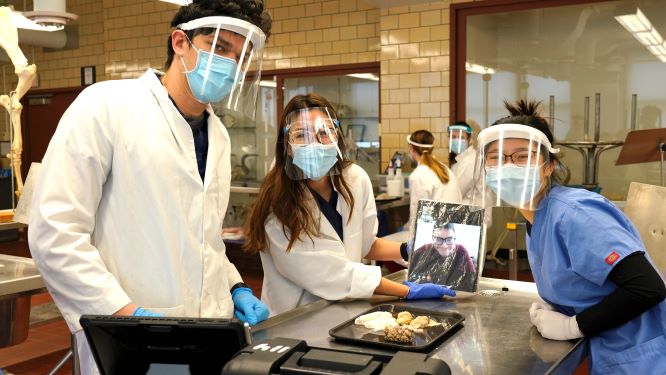
When students enter veterinary school, they expect the challenge of rigorous coursework and clinical training. What they couldn’t have expected, however, is a pandemic that upended every aspect of their scholarly work. Students in the Cornell College of Veterinary Medicine (CVM) have demonstrated admirable flexibility when adapting to the countless changes over the course of the last year and a half.
Here, students from the Cornell Veterinary Classes of 2021-2024 share their perspectives on what it’s been like to learn during the coronavirus pandemic.
Class of 2021
Q What are your anticipated plans after graduation?
Michaela Fontaine, D.V.M. ’21: After graduation in May, I will be going into small animal private practice near Saratoga Springs, New York.
Kwamina Otseidu, D.V.M. ’21: After graduation I will be heading to Michigan where I will be practicing at a small animal and exotics practice.
Rachael Strauss, D.V.M. ’21: I will be a small animal general practitioner in Long Beach, California. My long-term career goals include multi-practice ownership and working in the business industry of veterinary medicine.
Q What were the most significant changes in the way you experienced the D.V.M. program in the last year? How did you and/or Cornell adapt to make it work safely and efficiently?
Fontaine: I think that the Class of 2021, unfortunately, experienced the biggest impact on our education in the last year. We were supposed to begin our hands-on clinical training in the hospital last March, just as everything was shut down due to COVID. Since being in-person is essential to clinical skills and training, we were unable to begin rotations as planned; our rotations were postponed and we began online learning.
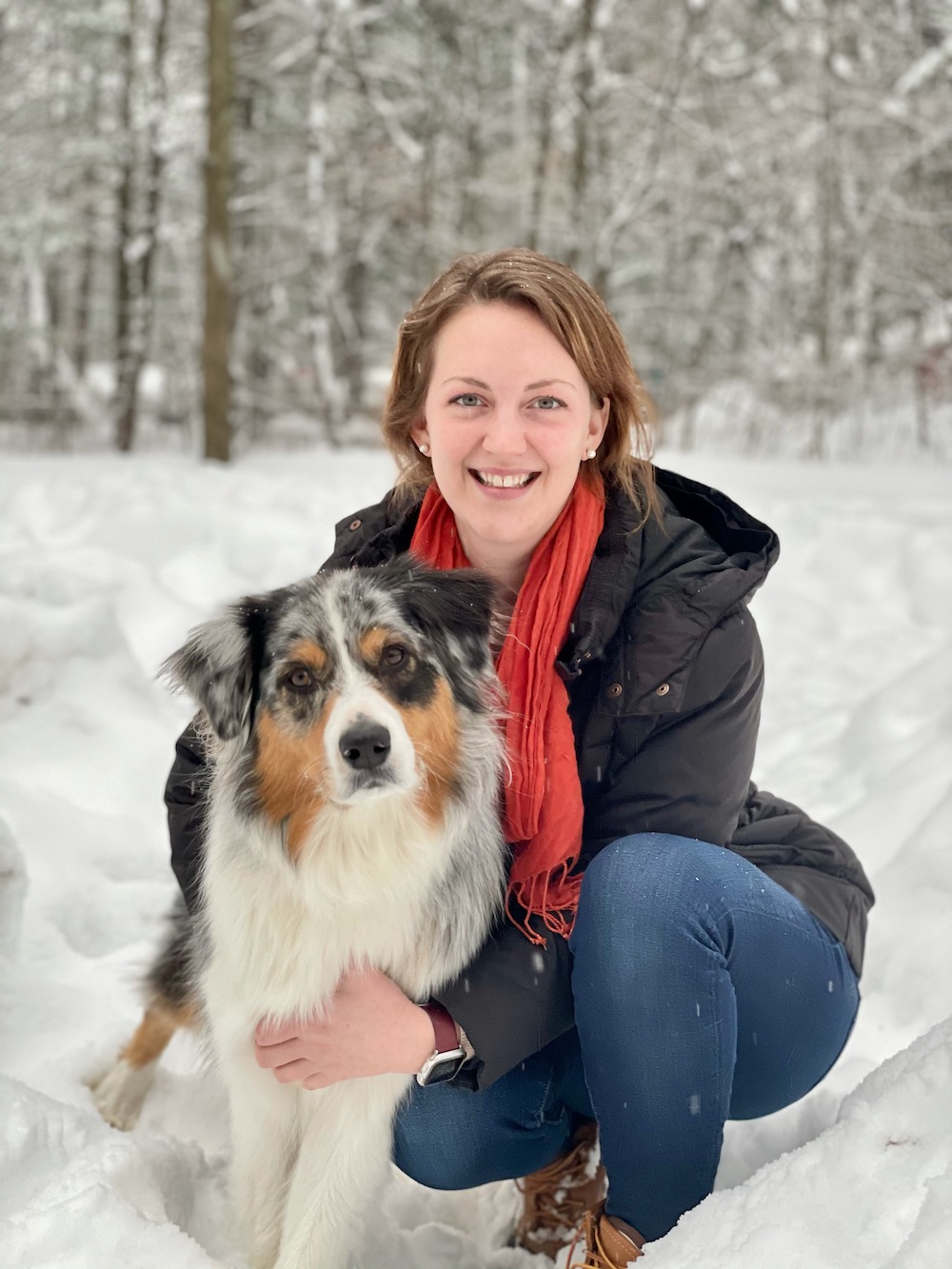
Otseidu: I started clinics in the last year, which gave me completely different D.V.M. experience from my previous three years. I finally had the opportunity to interact with clients and patients, and get hands-on veterinary medical experience. Unfortunately, due to COVID, clients were not allowed into the hospital. I had less time to have conversations with clients, but also more time to work with patients freely without being observed by owners.
Strauss: Immediately before we were to begin clinics, we were told that our clinical rotations were canceled due to COVID-19 and that an all-virtual schedule would be implemented for the foreseeable future. In a time already filled with so much change and anticipation for in-hospital learning, and then finding out that everything you had expected was not going to happen, it was a really difficult thing to accept and process.
What was amazing to be a part of was the camaraderie that the Cornell administration, faculty and members of my class had to adapt and continue learning in a non-traditional format. The “Transition to Clinical Practice” course was delivered entirely online and was the culmination of work from so many faculty coming together to ensure that my class received the education that we needed to succeed. I was blown away by what came together in such a short period of time. While there was certainly some funny moments (like trying to simulate learning how to perform an ultrasound while at home), I did learn a lot and I appreciated the community coming together as best as possible during that uncertain time to forward our education.
Q What moment at Cornell stands out to you in the last year?
Fontaine: I think the moment that stands out most to me is when we found out that in-person clinics would be canceled with no definitive return date last March. This was the moment when most of us realized that we would not have anything close to a normal clinical year and that huge adjustments would have to be made for us to gain the clinical experience that is necessary to graduate as a competent new veterinarian. After three years in the classroom, it was a very scary realization that not only would we not be starting in the clinic, but that our clinical training was postponed until further notice.
Strauss: I really enjoyed working with my classmates this year. On many occasions, with all of the changes associated with COVID-19, with having to navigate the job search during clinics, and with taking the North American Veterinary Licensing Examination (NAVLE), it was a team effort to make sure that we could each attend to the things happening in our lives outside of clinics. I always felt supported when I would express certain scheduling needs, and we all helped each other.
"I would not have been able to get through this year without my classmates and the faculty and staff in the teaching hospital. They were able to provide little moments of empathy and support amongst a lot of background chaos, and I am very grateful for that."
— Rachael Strauss, D.V.M. '21Q Has anything become a hallmark of your learning during the pandemic?
Fontaine: Zoom. Zoom has been a critical tool for communication during the pandemic, but virtual rounds unfortunately are not the same as being in-person. It’s much harder to stay engaged while on the computer, rather than face-to-face.
Otseidu: Zoom meetings have definitely become a staple over this past year!
Strauss: Because of the changes to teaching hospital guidelines and protocols during the pandemic, I learned to be more active in my learning. Because people were more spread out in the hospital, I had to make an active effort to seek learning opportunities that I felt were important for my clinical education. It was a great exercise in learning how to communicate openly within a team, and to have set goals to reach for learning. It made me realize that I had to create opportunities for myself rather than assume they will happen naturally.
Q What has been the most unexpected change for you? What has stayed the same?
Fontaine: I don’t think many of us expected how much the pandemic would impact our clinical year opportunities. Of course, we realized that some changes would be made out of necessity for safety, but there are some changes that had to occur that I don’t think any of us ever could have imagined. The main change that comes to mind is that many students were required to give up Opportunity Blocks during our clinical year, which normally provide the chance to pursue unique opportunities in veterinary medicine that are different from what is offered at Cornell. These experiences typically allow students to tailor their clinical schedule to fit their specific interests, and many of us lost that chance, due to the risks associated with travel. This meant that some students had to give up opportunities that they had been planning for months or years, which was something no one could have predicted.
Now that our class is back in the hospital, there are many things that feel very “normal.” I think overall, since returning to the hospital, many things function just as they would have in a normal year, except for the fact that everyone is wearing masks.
I also think that, though we have had an abbreviated clinical year, without a doubt, clinics have still been the most enjoyable part of vet school.
Otseidu: Coming into clinics, there were many big schedule changes due to the initial closing of school over the summer. We have also had some of the in-person rotations shortened. We have also been doing many of the rounds through Zoom.
Strauss: I am one of those people who had all of my clinics schedule planned out perfectly way in advance. I had scheduled three Opportunity Blocks in various regions of the country, and was so excited to explore a variety of small animal general practices to learn what I wanted to look for in a job after graduation. As anyone can imagine, that schedule was completely rearranged. I had to cancel all of my Opportunity Blocks. Ultimately, it was an amazing opportunity to redefine what my goals for the Opportunity Blocks were. I decided to do a two-week externship in emergency and critical care to see what emergency medicine is like in a private practice. I was able to do a business Opportunity Block in partnership with the Cornell Center for Veterinary Business and Entrepreneurship, an area of veterinary medicine I'm extremely interested in pursuing in the future. I was also able to add an additional rotation with the Cornell dermatology service, because I knew it would be useful for my future career as a general practitioner. It was all completely unexpected compared to my original plan, but all of my Opportunity Blocks were valuable experiences.
Q What have you learned about yourself? About your peers or instructors?
Fontaine: I’m proud of our class for making it through this year and making the best out of an unimaginably difficult situation. I think that the past year has been very hard on many of us, particularly in regards to the travel and social restrictions due to the pandemic. Many of us have not seen our families or left the area since coming back to Ithaca in August. Social activities and visits with friends that used to help relieve stress have been all but non-existent.
I think that this year has shown me that our class is incredibly resilient, because clinics are hard and stressful even during a normal year, but when you take away one’s outlets to help relieve stress, it makes the year that much harder.
Otseidu: Clinics during COVID reinforced something I already knew — that the class of 2021 is resilient and can overcome any obstacle!
Strauss: In the past year, I've learned to be less hard on myself. Before this year, I had all of these expectations about what I would learn during my clinical rotations, and how it would go, and none of it happened. I learned to accept that everything is a learning process, and that curiosity and desire to learn is the most important aspect, rather than knowing everything.
Q Is there anything else you’d like people to know about the last year?
Otseidu: Challenges will always appear, and nothing will ever go as planned. It’s important to learn how to adapt in order to make the best out of a bad situation.
Strauss: Without COVID-19, fourth-year veterinary students are faced with a challenge to perform well in clinics, learn as much as they possibly can, pass the NAVLE and find a job. With the addition of a global pandemic, all of the unexpected and rapid changes throughout the year, and the uncertainty of planning for the future without knowing what the future would look like, there were times when it all felt insurmountable.
I would not have been able to get through this year without my classmates and the faculty and staff in the teaching hospital. They were able to provide little moments of empathy and support amongst a lot of background chaos, and I am very grateful for that.
Class of 2022
Q What are your anticipated plans after graduation?
Xanth El-Sayed, D.V.M. ’22: I plan to pursue a career in either emergency medicine or general practice working with small animals, exotics and aquatic animals with a long-term goal of multiple-practice ownership. I also hope to volunteer with terrestrial and aquatic wildlife in my free time.
Karuna Katariwala ’18, D.V.M. ’22: My post-graduation plans are a small animal rotating internship and then general practice.
Q What were the most significant changes in the way you experienced the D.V.M. program in the last year? How did you and/or Cornell adapt to make it work safely and efficiently?
El-Sayed: Definitely being a vet student from home was the most significant change. Immediately after COVID-19 hit, I spent spring semester of 2020 back in California with my family. Since all our classes were asynchronous (pre-recorded or recordings from the live lecture the previous year), it was easier to manage being a vet student in a different time zone. However, my parents’ internet was not the most reliable. Cornell paid for an upgraded internet plan for the rest of the semester so that I could access and watch my recordings without having to take on the expense myself. After spring semester, I returned to Ithaca where I have stayed for the rest of the academic year.
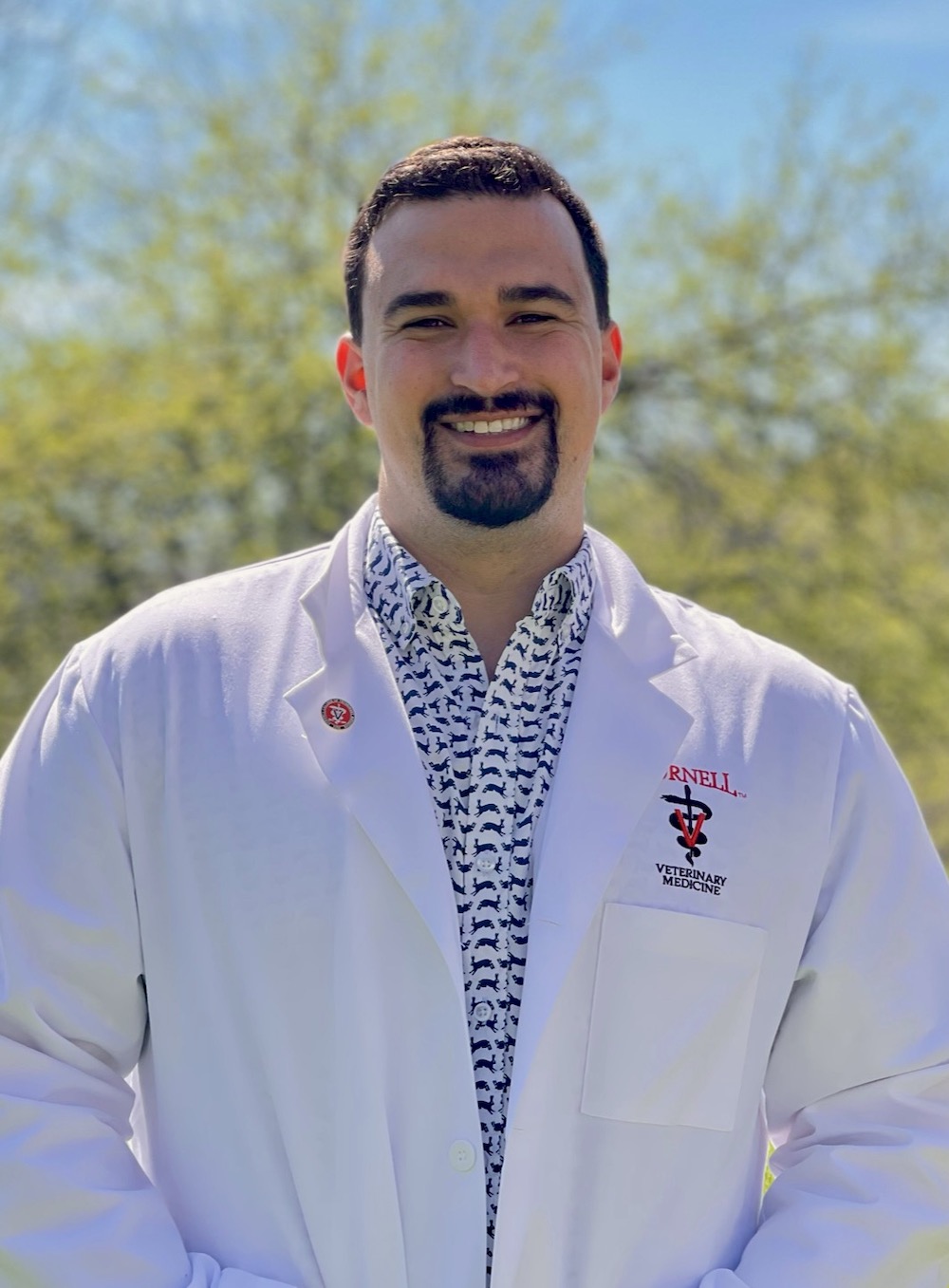
Katariwala: The biggest change we had to our curriculum was the adaptation to our junior surgery. We traditionally have these during the spring of our second year with 10 groups of students working at the same time. With COVID restrictions, Pati [Kirch, teaching support specialist], Nina [Thompson, veterinary technician] and all the other staff and faculty who help with this had to change the way we did surgeries to abide by physical distancing rules. This past fall of 2020, we were able to perform our junior surgeries with only three groups of students working at the same time.
The attention, assistance and experience I received was incredible for my education. With the smaller amount of students, the veterinarians and nurses were able to better accommodate all of us students and could support us through this learning experience so much better. The amount of work Pati and Nina needed to put into organizing these surgeries over two months did not go unnoticed and the changes made were much more beneficial to our education. I learned so much from this experience and was able to ask the surgeons and anesthesiologist many more questions!
Q What moment at Cornell stands out to you in the last year?
El-Sayed: Definitely getting to do our spay procedures this past fall. Normally, we do our spays in the spring semester of the second year. However, since COVID-19 hit before we were able to do them, they had to be postponed. Luckily, with Cornell's COVID-19 surveillance testing and a LOT of extra effort from licensed veterinary technician and teaching support specialist Pati Kirch and the rest of the faculty, we were able to do those procedures in person this past fall.
Katariwala: The support that we received from the university with testing and isolation is something I do not take for granted. A lot of my close friends are at veterinary schools internationally and they do not have a university-sponsored surveillance testing. If they got COVID-19 or were exposed to COVID-19, they would need to isolate and get tested from their own pocket, and it would cost about $120 per test.
Hearing that Cornell was mandating surveillance testing was comforting to me because I knew that the university was trying to keep our community safe. Stepping out of our Cornell bubble and realizing how lucky we are to be part of an institution that is providing so much for us in a time of need makes me extremely fortunate.
Q Has anything become a hallmark of your learning during the pandemic?
"I am grateful that my friendships have stayed strong through the pandemic. We are able to have game nights and talk to each other about life. These mini getaways from school and my bubble are the perfect weekly medicine."
— Karuna Katariwala ’18, D.V.M. ’22El-Sayed: Being adaptable and resilient. COVID-19 completely changed the face of the tried-and-true method of teaching that our class was expecting to have this past year. We had to adapt to new methods of teaching, face new challenges (like staring at a screen for 10-plus hours a day) and redefine community amongst our class.
As the pandemic continued, changes (to schedules, courses, teaching methods, etc.) became a daily occurrence for our class. Learning to roll with the punches and trusting that you would be okay in the end became an essential skill.
Katariwala: Coffee, Ben & Jerry’s and my standing desk have become essentials for me with doing work at home. Coffee to keep me going, Ben & Jerry's to keep me sane and then my standing desk to keep me out of my bed.
Q What has been the most unexpected change for you? What has stayed the same?
El-Sayed: My most unexpected change was learning to be okay with being alone for so long. It’s weird not interacting with peers in between classes or at work. And I forgot how long it had been since I had spent this much time with myself. It was nice at points but also helped me really appreciate the chances I did get to talk to friends and family on the phone or on Zoom.
I am thankful that our class’ trajectory has stayed the same in terms of where we are in the program. The order of things might have switched around, but we are still in line to graduate on time and, at the time of graduation, will have had mostly all of the same experiences as other classes who graduated prior to COVID-19.
Katariwala: The most unexpected change stemmed from the way I learned. I realized that I needed to force myself to take breaks in the middle of the day since I became a work robot within the first few weeks. I never thought I was the person who could go eight hours without a break and then realized I was that person. Forcing yourself to take a break is much harder than you think. You are in a mindspace and to break that concentration is difficult especially for type-A people like myself.
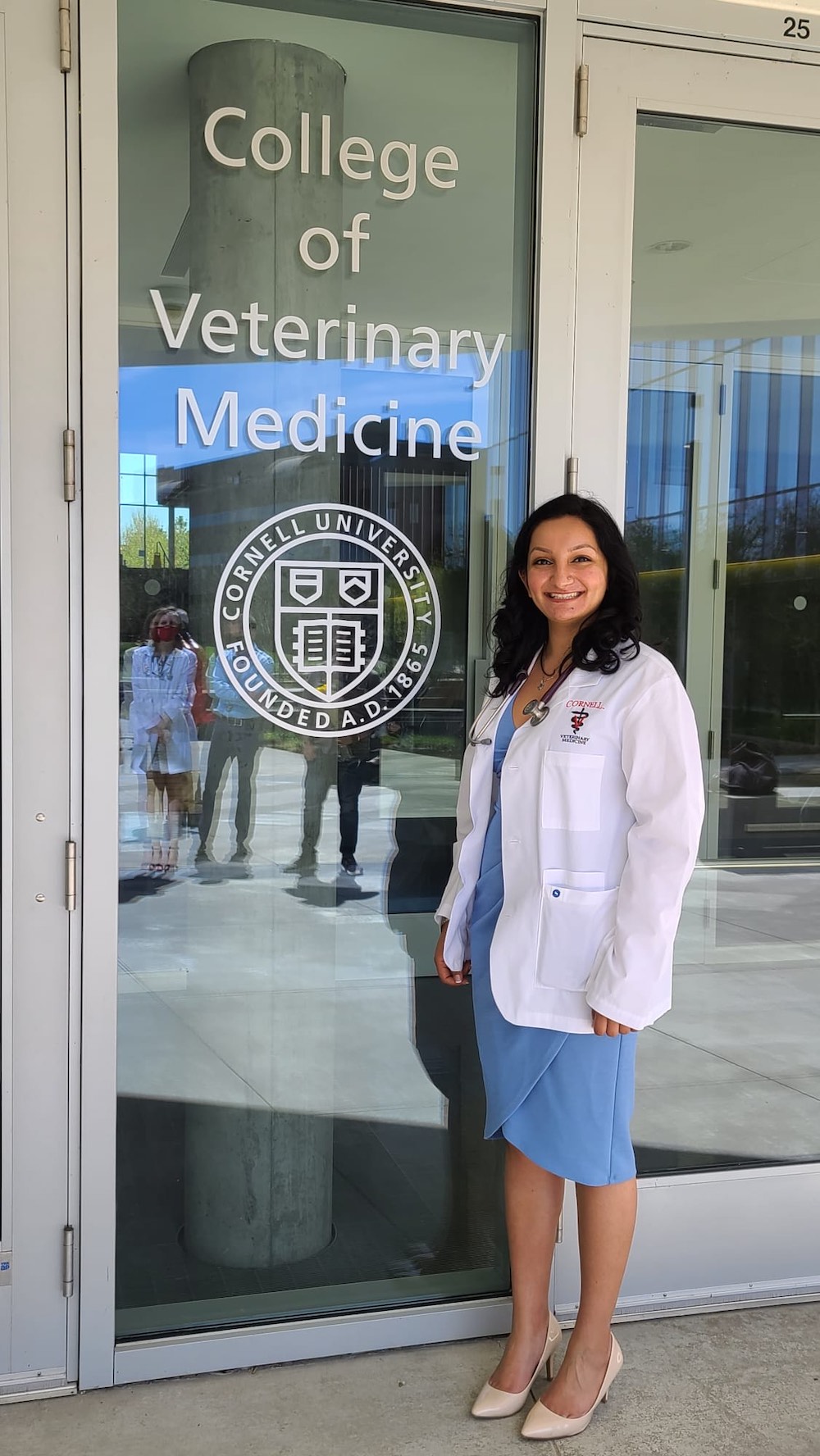
I am grateful that my friendships have stayed strong through the pandemic. We are able to have game nights and talk to each other about life. These mini getaways from school and my bubble are the perfect weekly medicine.
Q What have you learned about yourself? About your peers or instructors?
El-Sayed: The answer about resiliency and adaptability could be used here for me and my peers. I think COVID-19 also challenged the faculty and instructors, many of whom had not used virtual platforms to teach. I think we have all learned some things that virtual platforms are great for and some things that we would rather never do virtually again. I hope that this helps to advance the curriculum toolbelt of our instructors as they continue to look for innovative ways to teach.
Katariwala: I learned that an unstructured learning environment does not suit me well. I am excited to start clinics in a few weeks and have that structure and vigor shape my life! The kindness and compassion I received from my instructors throughout the pandemic for accommodations and just saying 'hi' sometimes, made them a shining light in these times.
Q Is there anything else you’d like people to know about the last year?
Katariwala: We are all in this together! With everything else that is going on in the world, be grateful every day and treat people with kindness.
Class of 2023
Q What are your anticipated plans after graduation?
Djion Holness, D.V.M. ’23: My post-graduation plans are broad in that I am interested in emergency medicine, public health through advocacy and leadership and shelter medicine.
Christina Kennedy ’20, D.V.M. ’23: My goal is to become a small animal general practice owner with a special interest in surgery and client education programs.
Ashley Yao, D.V.M. ’23: I am planning on working as a small animal veterinarian after graduation, although I’m still mulling over potentially specializing.
Q What were the most significant changes in the way you experienced the D.V.M. program in the last year? How did you and/or Cornell adapt to make it work safely and efficiently?
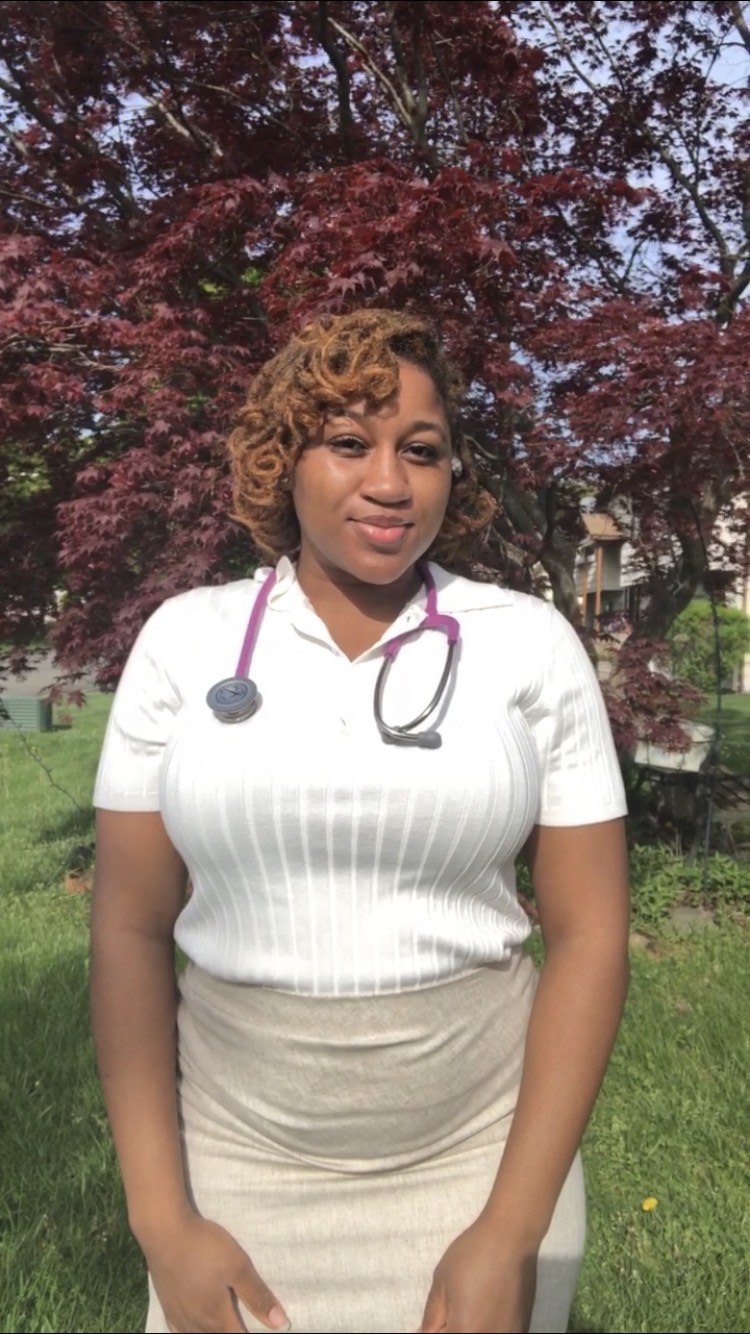
Holness: Like most of us, working from home required a major learning curve — especially as someone who did all of their studying at school. When the lockdown began, I decided to return to my family home. One major challenge was learning to work around my parents and the attention that they sought from me. Additionally, with increased dependence on technology followed increased technical difficulties. This ranged from needing a device with drawing capabilities, to increasing our house’s broadband/getting a WiFi device. The faculty and staff offered a lot of support with the ever-changing situation. The patience and understanding that my professors showed me definitely helped to make the transition more manageable.
Kennedy: I personally missed having the opportunities to truly connect with the dozens of faculty members who rotate on and off our computer screens. Many people are understandably not as comfortable on Zoom and that can have a profound impact on how the students perceive the faculty member’s interest on the subject, compassion for the students and overall desire to even teach the lecture. It is a two-way street, though, and unfortunately I think students can easily forget their impact as well. The relationships are not as effortless or natural as they once were, but I have faith that clinics will bring those opportunities back to us!
Yao: I think like many others, we’ve transitioned mostly to online Zoom meetings. Most of my lectures were over Zoom, with some that streamed synchronously from the lecture halls at school. Within the first few months of the pandemic, we had to learn how to use Zoom effectively for tutor group meetings, a core element of problem-based learning. Although I think the transition was smooth, I would have obviously rather met with my classmates in person, in a tutor room at school!
Even though we did a lot of learning and lectures over Zoom, we had some opportunities to do in-person labs, which had to be spread out over multiple sessions to accommodate the capacity issues within the school.
Q What moment at Cornell stands out to you in the last year?
Holness: Everything happened so fast: One moment we were in our regular classes and the next we were told all classes would be completely online. It was remarkable to see how an entire course was transformed to an online setting over a week. When talking to the faculty, it was clear that they were doing everything in their power to maintain the quality of our education. Things obviously couldn’t be the same but it was clear that professors were giving their all.
The pandemic made me less likely to speak up during virtual lectures. At a moment when I was struggling the most, I was touched by how one of my professors directly asked me if I had questions and set up a Zoom meeting for us. To feel seen at a moment when circumstances left me feeling unnoticed and lost was heartwarming!
I was quite inspired by how my batch mates and student leaders advocated for one another. The distance caused by the pandemic did not dampen the fact that we all cared about each other and about getting the most out of our education. At some points there was definitely a disconnect between the goals and priorities of faculty and students. I was proud and honored to be a part of our student leaders that initiated more interactive components of our curriculum, and voiced our concerns in relation to mental health.
Kennedy: It was the second day of the spring 2021 semester when I realized that our class had been partaking in “online vet school” longer than “regular vet school.” That was a sad moment and now an entire other semester has gone by since. The days can be long (very, very long) in vet school, but the years are flying by and I think most of the students will be very excited to go back to in-person instruction whenever safely possible.
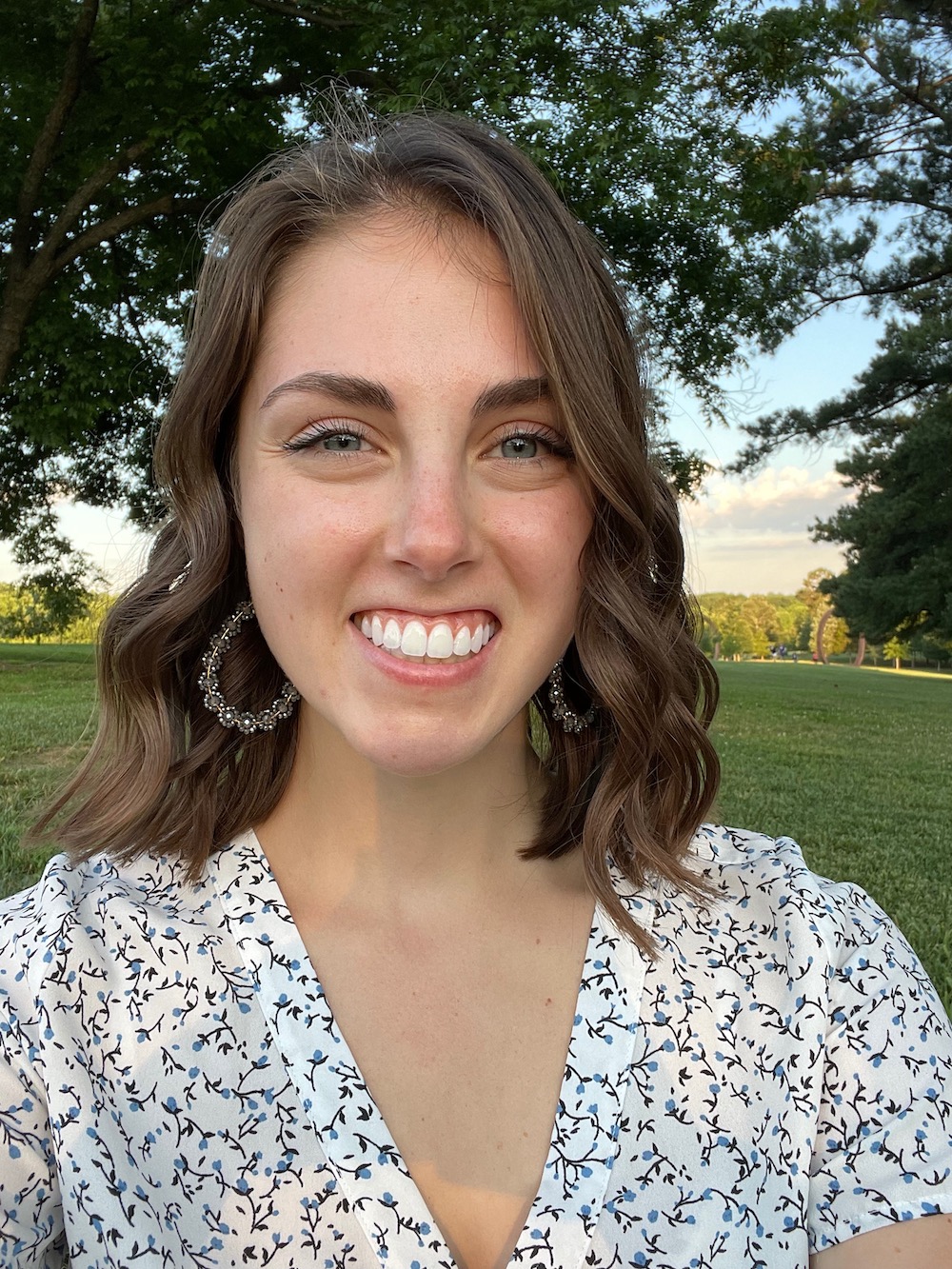
Yao: I'm not sure if there is one specific moment. I think this year has been challenging, and I am really proud of the way that my classmates and I have stepped up to advocate for ourselves in different ways. Even before the pandemic, I think we all realize how important safeguarding our well-being is, and even more so when doing things virtually and with less in-person interaction. I hope we can continue to think about how we will transition back to “normal” in-person classes in the future.
There are some other small moments that I can think of — the different virtual panels that my classmates organized, virtual cooking classes (I did one with Dr. Jai Sweet and it was fantastic!), and the first ever virtual SAVMA auction. These are just a few examples of how we created different ways of engaging with each other.
Q Has anything become a hallmark of your learning during the pandemic?
Holness: We had always had access to lecture recordings but this year I used this resource so much more! Even when I attended synchronized lectures I would rewatch pretty much all lectures. It was a great way to study: You would find me listening to recordings while I drove, worked out or cleaned around the house. Hearing the content repeatedly was a study resource that became a staple during the pandemic.
Kennedy: This was already important to me pre-pandemic, but my standing desk in the library is probably the biggest contributing factor to my somewhat-sustained focus. It forces me to stay awake, allowing me to remain engaged in online lectures and give faculty the attention and interaction they deserve.
I also think there is a large degree of flexibility which became a required hallmark of our class’ learning. The pandemic is not a situation that the students and faculty could have expected, but, overall, I feel our class has been gracious about rolling with the punches and pushing forward toward a degree we are all clearly motivated to achieve.
Yao: Zoom, PollEverywhere and another computer monitor! I’m thankful that many professors found different ways to keep us engaged, even though it took some time to learn the ins and outs of Zoom and PollEverywhere.
Q What has been the most unexpected change for you? What has stayed the same?
Holness: Many of our most beloved and cherished annual functions were canceled because of the pandemic. Part of our community’s spirit is held within our social events. Though many of our regularly scheduled events were canceled, I loved to see how some social events adapted. As the SAVMA [Student American Veterinary Medical Association] senior delegate I was charged with planning our annual SAVMA auction alongside our SAVMA fundraising chair. Transforming this event to a virtual setting was challenging for a number of reasons, but at the end of six months of hard work, we were able to host a night of laughter and community whilst maintaining our average donation accrual, raising over $10,000 for students! Overall, it was nice to connect with our CVM community through events such as this one.
"Part of our community’s spirit is held within our social events. Though many of our regularly scheduled events were canceled, I loved to see how some social events adapted."
— Djion Holness, D.V.M. ’23Kennedy: I am not sure I necessarily realized how much I would miss the simple hallway, lecture hall and lunch line interactions with my peers and the staff at the college. Now, every time I see one of them getting a COVID test at school or through the library window, it is the most exciting part of my day!
I am extremely grateful and lucky to say that my desire to be in vet school and receive my D.V.M. has stayed the same. I wish it could have occurred in a more status-quo manner, but I have no doubt the Class of 2023 will come out as stunningly proficient and empathic veterinarians.
Yao: I used to study most of the time in the library at the vet school, so switching from that environment to studying at home is not something I expected to do. Although there are so many ways to make my home environment conducive to studying, I think it was still a big change and I had to learn how to separate studying in my home from taking breaks (and to avoid the feeling of being cooped up).
In terms of what has stayed the same, I have always enjoyed studying in groups. This hasn’t really changed with the pandemic, although it looks a bit different.
Q What have you learned about yourself? About your peers or instructors?
Holness: I learned about the true spirit of determination. The world was practically falling apart around us and both faculty and students alike were able to adapt and make the most out of the year. It definitely wasn’t always pretty: The pandemic surfaced many underlying issues and created a whole bag of new ones. But by taking an active role in our curriculum and working collaboratively with faculty and staff we have continuously been able to better our education.
Kennedy: My peers in the Class of 2023 are strong. We made it through the Block I server crash, the COVID-shutdown neuroanatomy final, over a year of virtual vet school and now we are just trying to make it through to clinics and graduation. The exceedingly large majority of our instructors are doing their best to help us enjoy and utilize the curriculum. They have made sacrifices and alterations to maximize our learning and that does not go unnoticed by the hard-working students they are trying to teach.
As for me, I have learned that I have an “I don’t know what is happening in this lecture” stress laugh that is very noticeable on Zoom and is entertaining to many of my classmates.
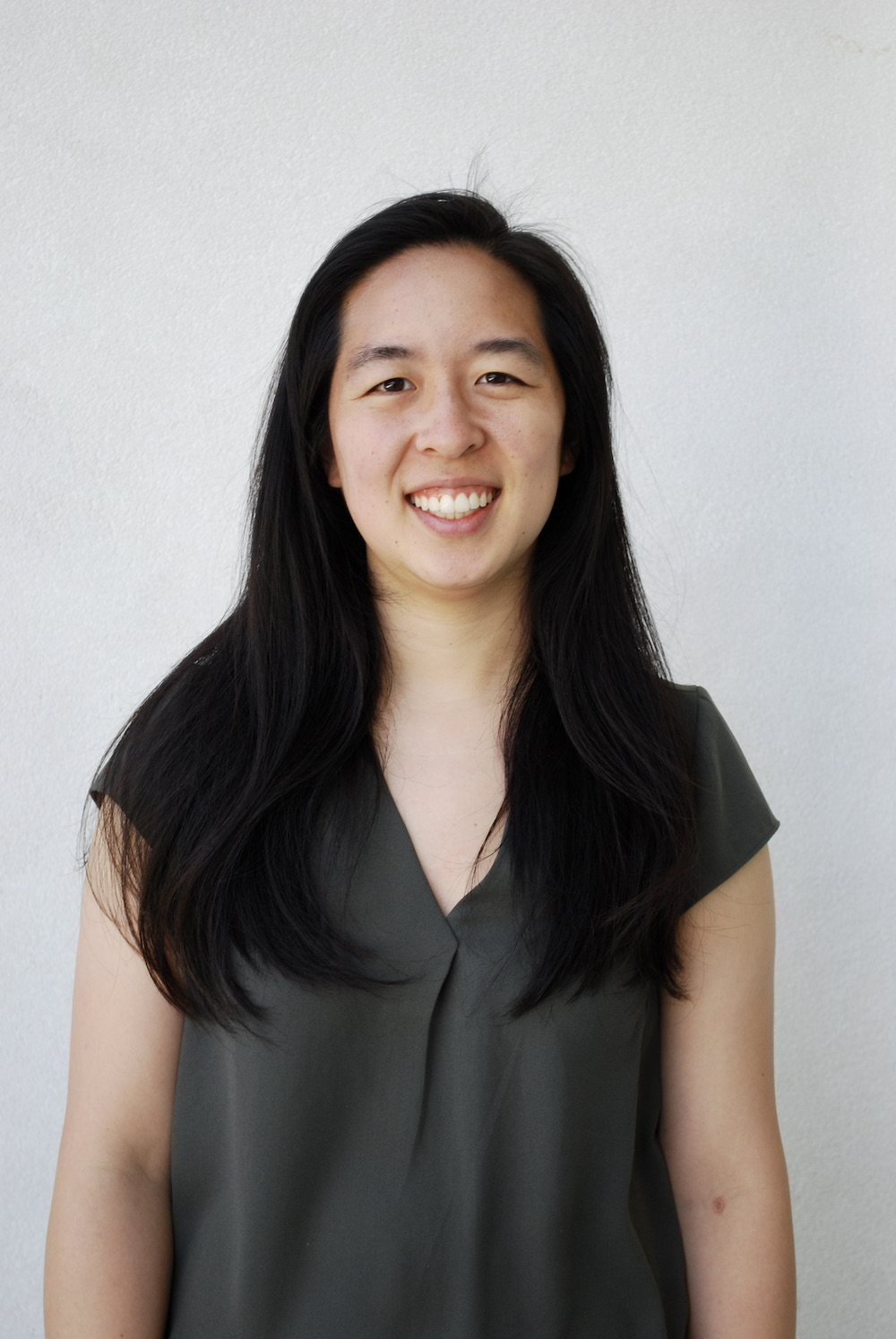
Yao: I’ve learned that I do better when I take more breaks! I think being in one place to study, eat, sleep, etc. is a bit exhausting, so I’m glad to have access to nice places to walk in nature close to home, so that I can give myself a break mentally. I have also learned that my peers are resilient and generous. We have been able to support each other in different ways this year and for that I’m grateful.
In terms of instructors, I have learned about the range of things that they have done to engage us in a virtual setting — some used audio/podcasts, pre-recorded videos and polls as new ways of guiding us through material. I am happy that many were able to adapt their material and styles of teaching.
Q Is there anything else you’d like people to know about the last year?
Kennedy: I think it is important to recognize what motivation and dedication look like (as these seem to be misinterpreted by some). It does not necessarily mean spending all day studying the material from yesterday, today and tomorrow or spending well-deserved free time finding supplemental clinical opportunities. For some people, dedication could be deciding to sit at their desk instead of in bed for a morning lecture. For others, that could be going to a live lecture instead of watching the recording later. For some, it could be watching the lectures at all.
Meet people where they are and acknowledge the effort they are giving (no matter how it compares to expectations) because this year has been hard in more ways than I could possibly express for an entire class. Everyone needs a little more love and understanding because we are all trying our best.
Yao: I think many might hear “virtual classes” and the different adjustments to our learning/education — whether that be open-book exams or pass/fail grading — and think that we immediately had it easy. I would hope that they understand that that’s not the case! Of course, there’s a convenience with having all lectures over a computer screen, but there is a lot of “Zoom fatigue” that comes with it, and for me personally, cannot really replace learning in-person in a lecture hall.
This year has been stressful in many different ways, so I’m hopeful that next semester we will slowly adjust to a “new normal” and appreciate what we took for granted before.
Class of 2024
Q What are your anticipated plans after graduation?
Christel-Remy Kuck ’20, D.V.M. ’24: While I do not know my exact plans after graduation, my interests include wildlife — particularly avian — clinical practice, conservation and public health.
Yimei Lin, D.V.M. ’24: I hope to become a vet in Hawaii after graduation. I am also interested in small animal internal medicine, research and academia. Potentially, I would be interested in pursuing a career related to teaching as well.
Hery Ríos-Guzmán, D.V.M. ’24: My passion lies in the clinical treatment and conservation of marine and aquatic animals. From lobsters and coral reefs to penguins and manatees, I could not be more excited to work with these animals in the future! That fact that my interests are somewhat niched, and my uncertainty in terms of what is best for my career path, I am planning on undergoing an internship or a residency once I am finished with my pre-clinical and clinical studies. I might also strive for a Ph.D. in coral reef ecology, but that remains to be seen.
Q What were the most significant changes in the way you experienced the D.V.M. program in the last year? How did you and/or Cornell adapt to make it work safely and efficiently?
Kuck: Although I do not know what CVM was like before COVID as I am a first-year student, I am thankful that Cornell has been able to keep us safe throughout the pandemic and that COVID cases within CVM have been relatively low.
It is definitely difficult to balance learning needs of students with our safety, but I am grateful to have had all of my dissection and Block VII labs, including OSCEs, in person. Having even one or two in-person activities each week has greatly improved my learning experience throughout the pandemic, and the faculty have been very flexible in making the Zoom life as interactive as possible. And as the pandemic comes to an end, Cornell has been encouraging students to get vaccinated, helping us return to a sense of normalcy as restrictions start to get lifted and we are able to have more in-person events.
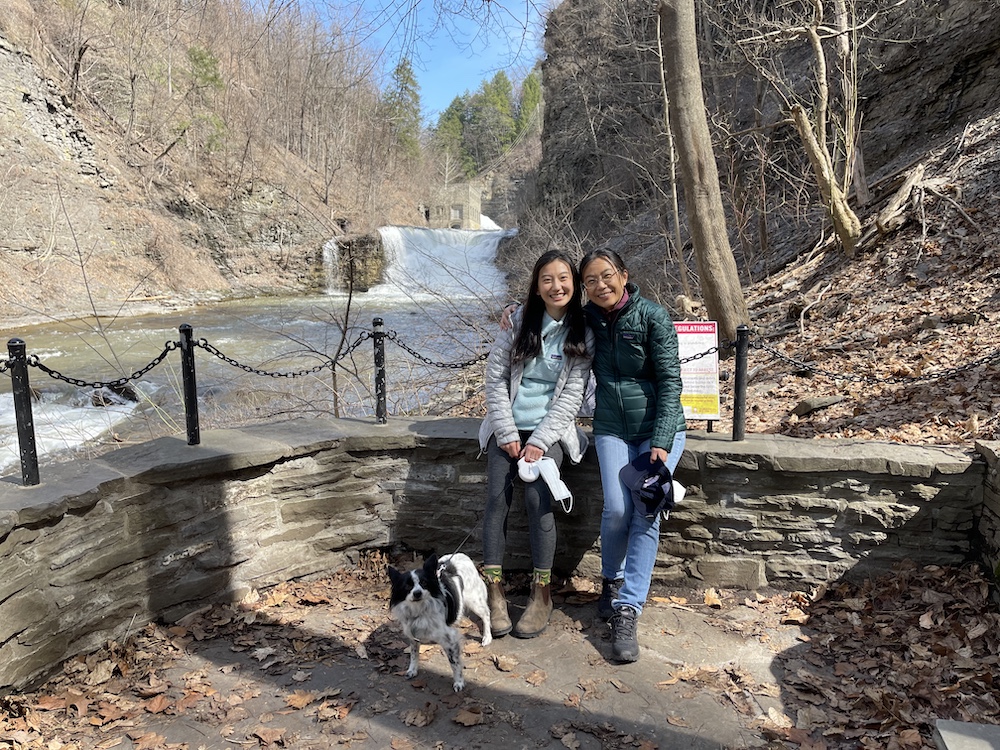
Lin: Living by myself in Ithaca has been a significant change I have experienced. I have always been close to my family, especially during senior year of college when I moved home from my undergraduate at Colgate University. I have been fortunate to be attending a school so close to home that my parents were able to visit me frequently.
When they had to travel to China to visit my grandparents during the spring of 2021, I felt very lonely at first since I was not able to see them as frequently. I adopted a dog, which made me spend more time outdoors and helped me enjoy living by myself. While I was not able to spend as much time with my family, I was able to connect with others in my class and become close friends with a few of them. Studying and hanging out together with my friends also helped me transition into my D.V.M. life better.
Ríos-Guzmán: Both thankfully and unfortunately, I have not yet had the experience of undergoing a “normal” veterinary degree. “Thankfully” because I really don’t know what I’m missing out on (ignorance is bliss). “Unfortunately” because, based on what I’ve heard, being in-person is the epitome of the veterinary degree experience. Most of my time has consisted of sitting in front of a computer and trying to imagine what it would be like to be taught in one of the lecture halls at the vet college. Honestly, it’s quite challenging to fully absorb the complex material that’s being thrown at you when it’s a Wednesday at 8 a.m. and you’ve had less than five minutes to change gears from a lecture on pharmacology to starting a new tutor group. It’s a lot!
In any case, I’ve had many in-person experiences: All of my gross and comparative anatomy labs, in addition to the wonderful Block VII labs, have required that we come in to directly interact with animals. Cornell made sure that all of us were as safe as possible by limiting our group size and ensuring everyone used appropriate PPE. We were also tested on a regular basis, which definitely helped make sure that everyone was aware of their health status.
Q What moment at Cornell stands out to you in the last year?
Kuck: One of my favorite moments this past year has been meeting with Dr. Alexander Travis, who taught "Conservation Medicine," outside of class about career plans. Even in class, he inspired me to believe that I can do anything, helping me to reframe my plans and look at the tremendous impacts that veterinarians can make within a local community and on society. He helped clarify the steps I may take if I wanted to pursue a career in public health, and we spoke about the importance of mentorship at this stage of my career.
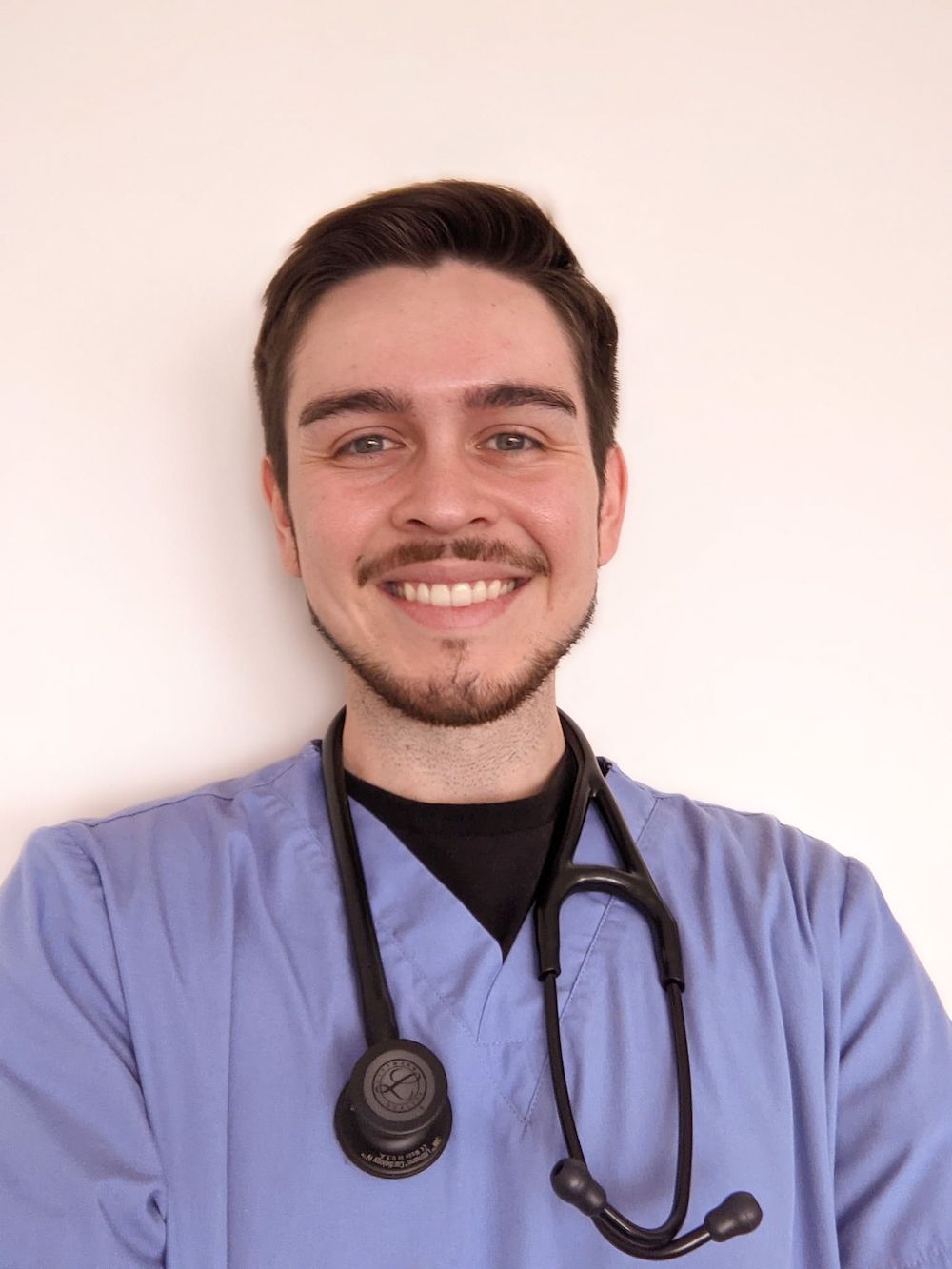
This conversation helped inspire me to start an Omega Tau Sigma Alumni Mentorship Program, which had overwhelmingly positive feedback from alumni, matching over 60 alumni to vet students!
Lin: I was reminded of my undergrad professors when I was looking for summer research opportunities and reached out to Dr. John Loftus. Dr. Loftus not only agreed to meet with me via Zoom but also invited me to sit in on their weekly lab meetings. It really made me feel welcomed and I was very grateful for his support. Ultimately, I ended up in a different lab for my summer research. Dr. Loftus reached out and supported me. His kindness and support really stood out and made me feel at home.
Ríos-Guzmán: Honestly, the way the faculty has adjusted how they teach their courses has been unprecedented. As I’ve said, I wasn’t here before the pandemic started, so I may be exaggerating, but it seems like faculty and course organizers quite literally turned the curriculum on its head while keeping our best interests in mind. I mean, not even my undergrad is allowing open book assessments, let alone creating office hours and adding student instructors to the meshwork of an already complicated system. I’m impressed!
Q Has anything become a hallmark of your learning during the pandemic?
Kuck: I honestly could not make it through the pandemic without my friends, both within the CVM community and outside of it. My peers, especially my tutor group, were indispensable to my understanding of the Block I material through our late-night study sessions and case reviews.
Lin: My iPad! I was never a huge fan of technology. I have always hand-written notes on paper all throughout college and it has served me well. But transitioning to iPad notetaking really allowed me to be more organized. My learning style changed slightly as well. With my iPad and my laptop, it has been extremely convenient for me to keep all my notes neatly organized and allowed me to become more efficient in my studying.
Ríos-Guzmán: The most important thing I’ve obtained from the pandemic (and the first year of vet school in general) in terms of my learning is that I need to sleep. Even after being told countless times, even by a professor in a one-on-one session, that sleeping is fundamental for my learning, I struggled with finding time to actually rest. And even though I still struggle to get in a good number of hours, sleeping, even if it’s an extra hour, does wonders for my learning capabilities.
Q What has been the most unexpected change for you? What has stayed the same?
Kuck: Although my motivation and drive haven’t changed moving from Cornell undergraduate to CVM, I am happy to say that I have made more room in my life for cultivating myself outside of veterinary school. Throughout my undergrad program, I spent an agonizing amount of time studying, but the pandemic has helped me prioritize myself by taking up some of my old hobbies again, including painting and martial arts. I am also able to make more time to socialize without feeling guilty for stepping away from my schoolwork.
Lin: My new learning habits and living with my dog were the two most unexpected changes for me this year. I was still able to connect with my family, friends from home, friends and professors from undergrad. So this stayed the same.
Ríos-Guzmán: I definitely did not expect to have as many in-person experiences as I did! My last semester of undergrad was completely online, so I believed it would be similar at Cornell.
"Throughout my undergrad program, I spent an agonizing amount of time studying, but the pandemic has helped me prioritize myself by taking up some of my old hobbies again, including painting and martial arts. I am also able to make more time to socialize without feeling guilty for stepping away from my schoolwork."
— Christel-Remy Kuck ’20, D.V.M. ’24Q What have you learned about yourself? About your peers or instructors?
Kuck: This year I have become increasingly aware of the importance of encouraging open dialogue on larger issues in veterinary medicine, especially mental health. From feelings of imposter syndrome to basic stress and mental health struggles, especially in light of the Not One More Vet movement, I have realized from talking to my peers and faculty that we are not alone in our struggles; even the people I take inspiration from have their own experiences with self-doubt.
Many of the faculty are becoming more vocal about how necessary it is to speak about mental health and how much they care about us. More than that, being open about our struggles has allowed me to see that although veterinary school is extremely challenging and there are issues facing the entire profession, I will always be able to find support, whether it be from peers or faculty.
Lin: I have learned that I am quite resilient to changes in my life. I find myself able to make the most out of my situations, whether good or bad. I understand that I am able to do that because of the privilege my family has provided me and the support from my friends and professors. These changes in my life over the past year all made me more aware of my potential as a future veterinarian. It also made me consider pursuing a career related to education, so that I could support and help others the same way my professors had done for me.
Ríos-Guzmán: I’ve learned many a thing about myself during this academic year at Cornell. First, the way I study is not efficient. I’ve had to change my study methods and consider different strategies in order to keep up with the sheer amount of material that we are expected to absorb and apply. Second, I learned how much of an impact the weather can have on my productivity. I’m used to the sun and heat, so experiencing literal weeks of cloudiness and dreary weather was tough. It has definitely made me more appreciative of the little things, like birdsong and flowers.
Finally, I’ve learned to work better and accept help from others. As future veterinarians, excellent teamwork is an absolute necessity if we hope to accomplish anything for our patients and for the veterinary field as a whole.
Q Is there anything else you’d like people to know about the last year?
Kuck: I wanted to express my gratitude for the D.V.M. Class of 2024: Our first year in vet college is already extremely confusing and difficult, even without COVID. Our previous worlds have been uprooted in many ways. From feeling as though the last stage of our lives did not close the way we hoped, to being ripped from our friends before graduation, to losing family members to COVID and feeling unsafe in a society with so much social unrest, it is enough to make us feel powerless.
Even though we struggle and are still early in our careers, I am so proud and inspired by my classmates and future colleagues. From hosting socially-distanced yoga classes and baking for faculty, to taking leadership positions within CVM and creating new organizations like the Association of Asian Veterinary Medical Professionals to increase visibility and support of AAPI individuals, I can see the extreme resilience of the entire class and can without a doubt say that we will make amazing contributions to the profession.
Lin: I feel that, in a way, we are all resilient people and we are all able to change our habits (whether it’s learning habits or living habits) in ways that allow us to thrive in the situation we are in. With that being said, I felt the open-notes exams and Zoom lectures really allowed me to learn and understand the materials better. It also reduced my stress related to academic challenges tremendously, compared to what I have expected at least.
I feel slightly anxious about how learning will be like after COVID, with in-person lectures and closed-book exams. I also understand that returning to normalcy may be inconvenient at first but it will be necessary. While I have faith in my ability to adapt to these changes, I just hope that certain aspects of our curriculum could be more flexible to accommodate the challenges that we may face as we return to normal school life.
Ríos-Guzmán: I can’t claim that we’ve all experienced the pandemic in the same shape, way or form, but all of us — peers and instructors and non-Cornellians alike — are inevitably part of the chaos that’s affected every single being on this Earth. I guess one could say that the pandemic has reminded all of us of our human condition, and that we constantly take things for granted both as people and as a species.
I’m optimistic that this challenging time has allowed people to actively and consciously reflect about what it means to be human, and the terrible ignorance with which many people consider that statement. With a lot of work and a bit of luck, I’m hopeful that we’ll emerge as a more considerate, more respectful and more thankful humanity. •
